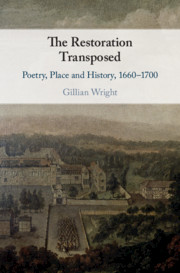Book contents
- The Restoration Transposed
- The Restoration Transposed
- Copyright page
- Dedication
- Contents
- Acknowledgements
- Textual Conventions
- Abbreviations
- Introduction
- Chapter 1 The Spenser Problem
- Chapter 2 Poetry and Restoration Ireland
- Chapter 3 Poetical Plants and Leafy Landscapes
- Conclusion Transposing the Restoration
- Selected Bibliography
- Index
Conclusion - Transposing the Restoration
Published online by Cambridge University Press: 21 September 2019
- The Restoration Transposed
- The Restoration Transposed
- Copyright page
- Dedication
- Contents
- Acknowledgements
- Textual Conventions
- Abbreviations
- Introduction
- Chapter 1 The Spenser Problem
- Chapter 2 Poetry and Restoration Ireland
- Chapter 3 Poetical Plants and Leafy Landscapes
- Conclusion Transposing the Restoration
- Selected Bibliography
- Index
Summary
‘Transposing the Restoration’ explores connections between, and assesses the cumulative impact of, the three main chapters of The Restoration Transposed. It considers the book’s implications for issues and topics such as translation, the transition from a manuscript- to a print-based literary culture, the spread of English-language literary publishing outside London, the participation and presentation of women in the literary sphere, and the development of the English literary canon. It also describes and seeks to account for the differing characters of each of the literary decades from the 1660s to the 1690s. It concludes by considering how the fresh perspectives offered by The Restoration Transposed may alter perceptions of poets as various as Milton, Marvell, Dryden, Cowley and Rochester and makes the case for the transposed Restoration as offering a view of its poetry that is less narrow and elitist and more sympathetic and open to diversity than conventional accounts of the period.
Keywords
- Type
- Chapter
- Information
- The Restoration TransposedPoetry, Place and History, 1660–1700, pp. 221 - 244Publisher: Cambridge University PressPrint publication year: 2019

